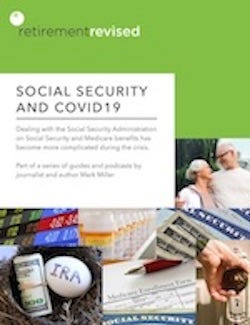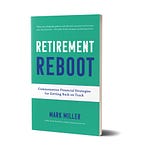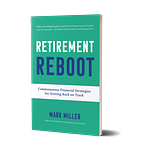
This week on the podcast, we take a look at the challenges facing couples as they navigate decisions about timing their retirement in the time of pandemic. This podcast stems from a column I wrote last month for the New York Times. That story examined how the pandemic is affecting all aspects of retirement timing for older workers - everything from the job losses happening due to the recession to age discrimination issues related to health risks.
Retirement timing is one of the most important factors affecting retirement plans. When you are able to work longer, those additional years of wage income make it easier to delay your Social Security filing, earning delayed filing credits. Working longer also can mean saving more and living off those savings for fewer years. It also could get you more years of employer-subsidized health insurance. (For more on this see my recent guide for subscribers on retirement timing.)
About one-third of baby boomers and Genxers tell pollsters that they plan to work longer because of the economic crisis. But that may be easier said than done. Even before the pandemic, about half of all workers who retired between age 55 and 64 did so involuntarily because of ill health, family responsibilities or job loss.
And the pandemic is going to make things much tougher. For the first time since World War II, the rate of unemployment and underemployment has been running higher for workers over age 65 than it for other adults. There’s also mounting evidence of a large spike in people taking early retirement, as I note in the Times story.
The virus creates a sort of double jeopardy for older workers - if they go back to work, they face a risk of serious illness. If they stay home, they stand to lose income and may be forced to file for Social Security earlier than planned. That will have lifetime financial consequences.
One of the topics I covered in the column is how couples are approaching these complicated questions. A decision to return to the workplace may not only create infection risk for that person but put a spouse at risk as well. I wanted to pursue that further on the podcast this week.
Joining me are two guests:
Katherine Carman is a senior economist at the RAND Corporation. Currently she is studying health insurance decisions and retirement decisions. And she is the co-author of a Rand study (pre-pandemic) on retirement patterns among couples. The research found a fluid pattern of decision making, often involving phased retirement, short-term jobs, and periods of non-employment and returns to work. She found that for most couples, there is a “discordant” phase, when one spouse works longer than the other.
Dorian Mintzer is an experienced therapist; retirement transition, money, relationship, and executive coach; consultant; speaker; and writer. She hosts the monthly Revolutionize your Retirement Interview with Experts series; she also is co-author of the award winning book The Couple's Retirement Puzzle: 10 Must-Have Conversations For Creating An Amazing New Life Together. And at age 74, Dori finds herself at a personal crossroads and she and her husband try to sort out their own retirement timing issues.
Not a subscriber yet? Take advantage of a special offer

Sign up now for the free or subscriber edition of the newsletter, and I’ll email a copy of my latest retirement guide to you. This one looks at dealing with the Social Security Administration during the COVID19 crisis.
Customer service at the Social Security Administration has changed during the coronavirus crisis - the agency closed its network of more than 1,200 field offices to the public in March.
Just a reminder- subscribers, have access to the entire series of guides at any time. Click on the little green button to subscribe, or go here to learn more.
Widespread unemployment and retirement risk
Widespread unemployment due to the pandemic would increase the number of older households at risk of being unable to maintain their pre-retirement standard of living. That’s not a big surprise.
But the latest update of the National Retirement Risk Index (NRRI) finds something else quite interesting. Low-income households face greater job risk, but their retirement security risk is similar to that of higher income groups.
The NRRI is produced by the Center for Retirement Research at Boston College. The latest update finds that widespread unemployment would increase the NRRI from 50.2 percent to 54.9 percent of all working-age households, resulting in an additional 4.7 percent of households at risk in retirement. The results for the 30 percent of households that experience the job loss are much more dramatic. The NRRI for this group increases from 54.4 percent to 75.4 percent, a 21-percentage-point jump.

But a closer look by income groups and age shows that while low-income households have a greater chance of losing their job than those in the upper two groups, their risk does not increase proportionately.

What’s going on? According to CRR:
One reason for this pattern is the progressivity of the Social Security benefit formula. Reduced lifetime earnings due to the employment shock increase the Social Security replacement rates for the unemployed in all income groups, but this effect is particularly important for the bottom third, which relies almost entirely on Social Security for retirement income.
I’m starting work now on a new story about the role Social Security plays in this very difficult economic climate in smoothing out retirement inequality, with a particular focus on race. Stay tuned.
Nursing home death rates exposes cracks in the system
The high death rates from COVID-19 in nursing homes and long term care facilities was a catastrophe waiting to happen. As Trudy Lieberman notes in this article for the USC Annenberg Center for Health Journalism:
The coronavirus pandemic has exposed the chasms, the fissures, the cracks in many American institutions. Nowhere, though, are they more apparent than in the nation’s arrangements for long-term care — specifically, in its nursing homes, where some 1.4 million people, mostly women, live out the rest of their days.
The virus has exposed what advocates for better treatment and families of loved ones in nursing facilities have known for years. Care is often substandard, infection control sometimes non-existent, living space overly crowded, staff members too few to keep residents safe, and a regulatory system that looks good on paper but too often looks the other way when politics and lobbying trump good enforcement and resident safety.
In May, the Government Accountability Office released a damning report showing that only 18% of the country’s nursing homes had no deficiencies for infection control and prevention in one or more of the years from 2013 through 2017, before the virus hit. That’s a grim indictment of how America cares for its most vulnerable elders. “It is a policy failure based on moral negligence,” said Larry Polivka, executive director of the Claude Pepper Center at Florida State University. “We need to understand more clearly this moral failure that is responsible for the crappy long-term care system we have built over the decades. It comes from not caring enough about older people when they need help.”
Lieberman goes on to cite several examples of exemplary reporting on the pandemic and nursing homes from outlets including Reuters, the Boston Globe and PBS NewsHour; you'll find links to those stories in Trudy's story.
Meanwhile, Paul Kleyman offers an excellent round-up on this topic in his Generations Beat Online newsletter that includes links to more worthwhile coverage. And Howard Gleckman of the Urban Institute asks this provocative question:
We’re having a national conversation about race and Policing - why aren’t we having one about race and long-term care?
Recommended reading this week
Covid-19 sickens seniors differently -here’s why . . . How a Covid-19 vaccine could cost Americans dearly . . . What seniors should know before going ahead with elective procedures . . . Planning to work beyond retirement age? Consider entrepreneurship . . . New internet radio station helps seniors share their favorite music.












